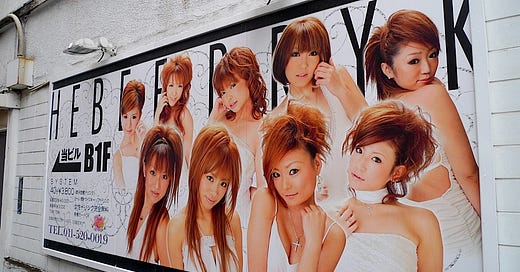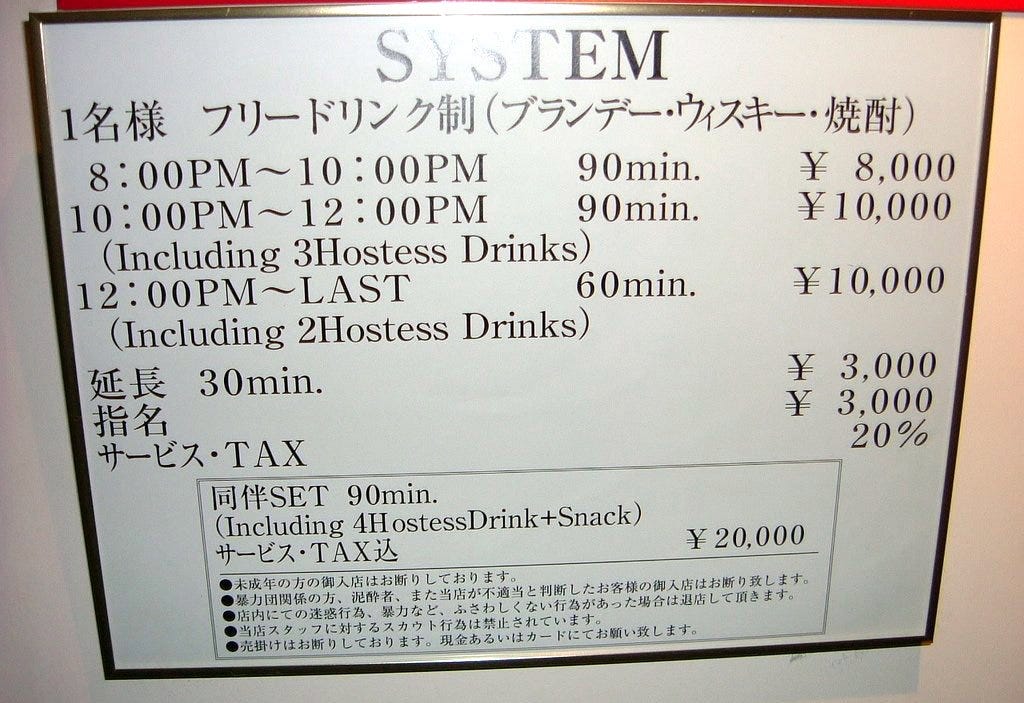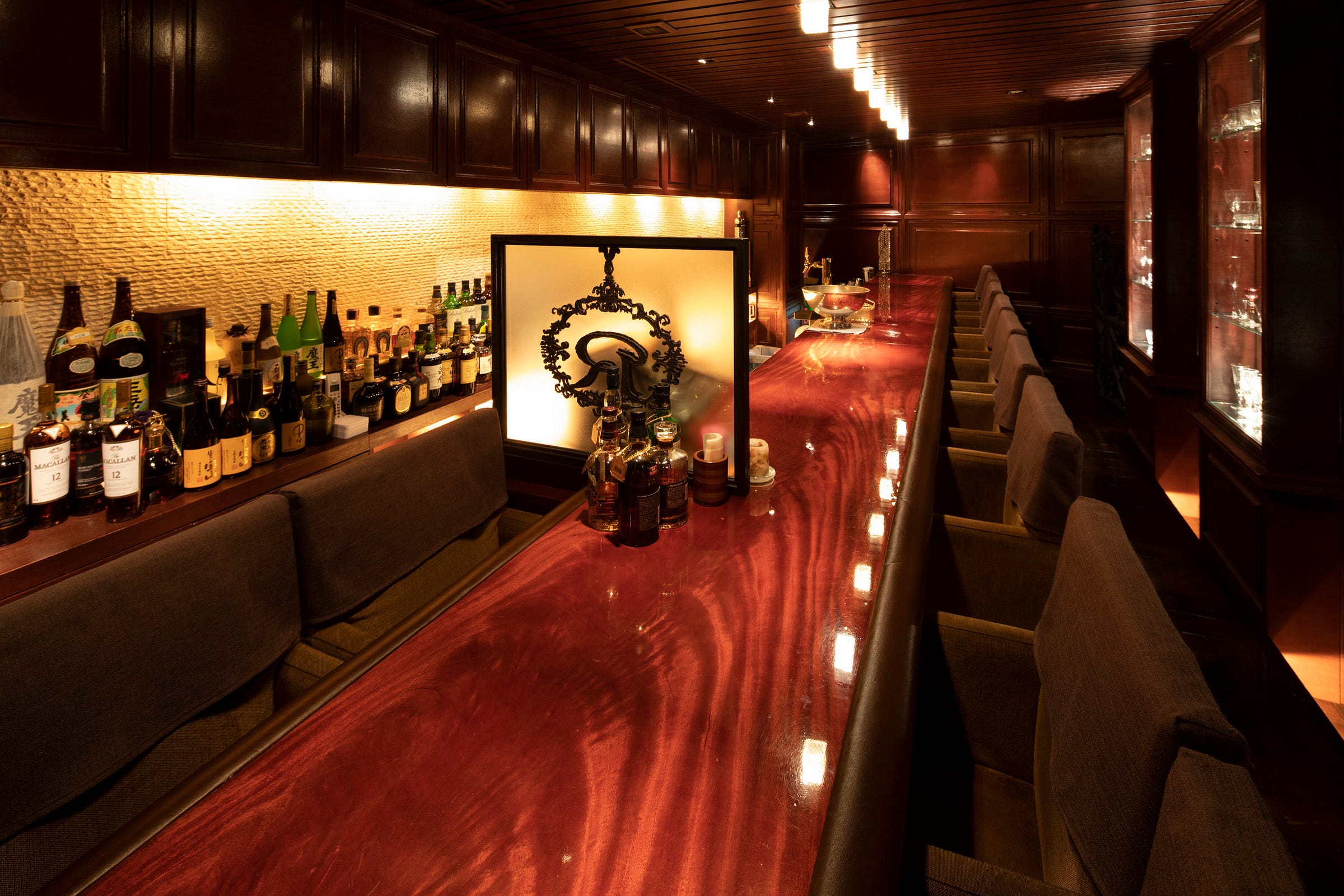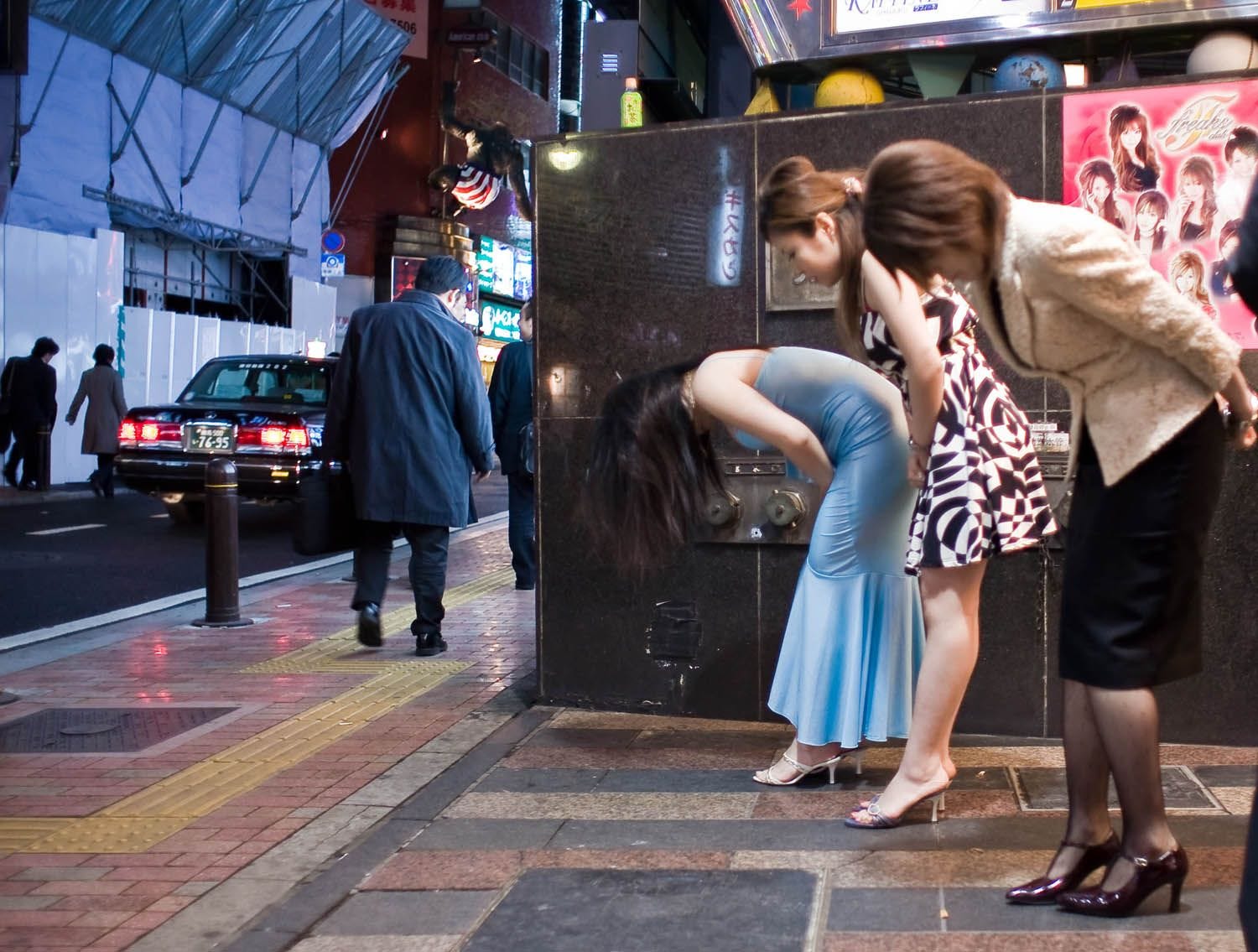In the exotic and endlessly fascinating world of Japanese entertainment and nightlife, few establishments are as secretive and hard to grasp as the hostess clubs. We are baffled by their over-the-top and somewhat old-fashioned show of opulence; their chandeliers, velvet sofas and glitter. Most of all, we don’t understand why someone (a man, usually) is willing to spend lots of money on overpriced booze just to chat with a few girls.
In order to solve the mystery of the hostess club and its junior, less classy version, the kyabakura (cabaret club), I had a chat with one of my wife’s friends, makeup artist Masuda Izumi, who knows this world very well.
Masuda has done this job for the last 25 years but her acquaintance with hostess clubs goes back ten years. “In the beginning, I worked for a temp agency that sent me to different places,” she says. “In time, I was able to develop personal relationships with some of them, and started working regularly at three clubs in Shinbashi and Ginza, in central Tokyo, and even host clubs in Shinjuku. I also worked at smaller places in the Tokyo and Yokohama suburbs.
Most people think that hostess clubs and kyabakura are all located in the city center, but a few of them can be found in less-trafficked neighborhoods and residential areas. They actually do quite good business because there is less competition.
Asked about what makes these places so alluring to a lot of men, Masuda says that hostesses and kyabajo (the girls who work at kyabakura) are very good at creating a comfortable, flirtatious and ego-boosting environment. “Most western men probably don’t need this sort of thing,” she says. “I guess it’s a very Japanese thing because many guys here don’t know how to deal with ladies. A good hostess is also a sort of psychologist who listens to the guys’ problems and offers them comfort and advice. Sometimes they can be considered as surrogate wives or girlfriends.
Ultimately, hostesses sell flattery. They make the customer feel good, important, and create the expectation that one day they may sleep with him.”
Speaking of the difference between hostess clubs (especially the high-end establishments) and kyabakura, Masuda says that “to put it simply, a kyabakura is a place where the girls are wooed by the customers. At a club, it’s the hostess who does the wooing. Then, from a professional point of view, the kyabajo are freer to decide how much they want to work and set their financial goals accordingly. Also, they generally have no definite sale quotas and are not fined for being late or making mistakes, as long as the customers are happy and spend money. At some kyabakura, it’s also okay if you do nothing to your hair. A club is a much stricter working environment where delays or keeping your hair straight is definitely not tolerated.”
The guys and ladies who work at the clubs – particularly those who are typically featured in magazines and TV shows – stand out for their flashy hairstyle, but according to Masuda, things, in reality, are a little different, especially outside Ginza. “Now many hosts are college students and their hair is pretty normal,” she says. “As for the girls, more of them are choosing a more subdued and adult-like hairstyle, like that of the Japanese TV announcers who are themselves a pretty popular category of working women.”
Masuda usually arrives at a club about one hour before it opens to business. “A lot of clubs open at 7:00 or 8:00 p.m. so I have to start working on the girls at around 6:00. However, not everybody begins her shift at the same time – some may start as late as 10:00 p.m. – so I have to be on standby until around 9:30 or 10:00 at the latest.
“Makeup artists get paid by the clubs. Each girl is deducted between 300 and 500 yen a day from her salary to cover makeup expenses. That money is used by the club to pay us. Sometimes it’s a time-based salary; sometimes it’s based on the total number of girls we do each month.”
By hanging around, talking to the girls and their mama-san (the ladies who manage the clubs), Masuda has learned many things about the world of hostessing. “I hear a lot of stories while doing the girls’ faces and hair,” she says. “For example, I hear a lot of complaints about troublesome customers. Some girl, for example, may say, ‘That guy is coming tonight. I’d rather be elsewhere.’ A recurrent problem among hostesses is that though they are rather slim, they are constantly told by their manager to lose weight. There is always a scale in the changing room – a reminder that everybody has to keep her weight in check. Also, the clubs have many dresses that the girls can borrow, but they all are extremely small. No way you can wear them unless you go on a diet. Management also puts constant pressure on the girls regarding their sales quota i.e. how many customers they manage to bring to the club and how much they make them spend.”
According to a survey that was conducted ten years ago, about 20% of high school girls wanted to become a kyabajo. Masuda agrees that now, compared to the past, there is a lot less resistance to the idea of being a hostess. “After all, if you are good at it, this is a job that gives you a chance to earn a lot of money while having a glamorous lifestyle and meeting lots of interesting people,” she says. “Now, for example, many cute college students choose it as a part-time job. It must be said that compared to ten years ago, these girls have a wider choice of jobs they can choose from, be it maid cafes or girls’ bars. This latter category is especially popular because they have the advantage that the girls sit in front of their customers, not next to them, which puts them to a safer distance from wandering hands and lusty guys.”
Hostessing may be a coveted job, but that does not mean it is an easy one as it entails much more than chatting and drinking with customers. “The ideal hostess must have common sense,” Masuda sense. “She must be professional and polite, and adult-like in her relationship with her customers. She must be intelligent and educated, follow the news and be able to talk about any topic. Many hostesses are obviously young but they are quite adult in their attitude. Girls who can only smile and say yes become boring pretty quickly. They must be able to control the flow and mood of the conversation.
“If you want to be successful in this business, you must also be an excellent observer and notice changes in people’s look and mood, however small they may be. For example, one day I had my hair cut a few centimeters. Most people didn’t even notice the change, but then I went to a club and as soon as a hostess saw me, she said, Masuda-san, have you cut your hair? In the end, a hostess must be sensitive and alert, and be able to read people. If you are KY (kuuki yomenai i.e. unable to read the mood) this is definitely not the job for you.”
Many hostesses - even those who work in very high-class clubs - are cute but not exceptionally beautiful. “That’s not a problem,” Masuda says. “You can be successful and earn a lot of money as long as you possess those qualities I’ve just mentioned.
“Also, popular hostesses use – you could say they reinvest – part of their earnings to buy little presents for their regular customers, and they remember all their birthdays. I saw many of them carrying around a tangocho (a ring of small flashcards). Junior high and high school students in Japan use them to memorize English vocabulary, but the hostesses write down important details about their clients, their interests and tastes, and topics they have talked about before. The guys who frequent the clubs are obviously happy to receive this royal treatment. It makes them feel special.”
I hope you liked this piece. I have a book on the subject titled "Butterflies of the Night." It's 30 years old so many of the details (e.g. prices) have changed but there's a lot of interesting details. If at least 10 readers let me know that they want to learn more on hostess clubs, I'll make a new post with quotes from the book.
If you are a new subscriber, you may want to check out my trip to Japan’s deep country, a report on being an asylum seeker in Japan, or a look at Tokyo movie theaters.
Please help me spread the word about Tokyo Calling and earn extra Karma points!











As always, this was fascinating. I've always found the idea of hostess clubs intriguing in a uniquely Japanese way, especially compared to what you find in the States.
Interesting and informative article. In Yokohama, I have been to a cabaret in Yokohama. I was told that such places charge the customers a certain ampount by the hour, which is inclusive of basic drinks and hostess' company, but they can also opt to order more expensive premium liquor by the bottle. Is this true?